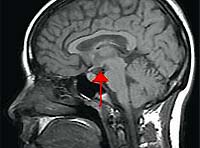Hypotalamic syndrome is a whole bouquet of manifestations related to the overall reason - the defeat of the hypothalamus. This little iron can bring the body a lot of trouble. Read more about the causes of the occurrence of hypothalamic syndrome, read in the article.
Content
Diseases of the hypothalamic region are very common, but they are not so simple to recognize. Some patients are treated from various diseases of internal organs and systems, while the cause of the disease is disorders in a small part of the brain - the hypothalamic region.
The hypothalamus is a brain department that owns the leading role in the regulation of many vital functions of the body, above all, the constancy of the internal environment. The hypothalamus is the highest vegetative center (vegetative or autonomous nervous system innervates internal organs), which is responsible for the body's adaptation to various activities, maintains the optimal level of metabolism, carries out thermoregulation and regulation of activities of all internal organs and blood vessels. The work of the hypothalamus passes in close relationship with the main iron of the internal secretion - pituitary, so the violations in this area always cause endocrine disorders. It controls food, sexual behavior and other mental functions.
Causes of hypothalamic syndrome
Hypotalamic syndrome is a series of symptoms arising from damage to the hypothalamic region and characterized by various disorders.
The cause of the hypothalamic syndrome can be the cranial and brain injury, lack of oxygen (for example, during the period of intrauterine development or by choking, drowning and t.D.), elevated intracranial pressure, chronic infections (for example, herpes), poisoning (for example, alcohol) stress, mental overvoltage, tumor and t.D.
The mechanism of occurrence and manifestation of hypothalamic syndrome
 With the defeat of the hypothalamus, its basic functions are disturbed, first of all - metabolism. Signs of metabolic disorders are a change in body weight (more often the mass is growing, but there may be a decrease), an increase in the concentration of certain substances in blood tests (glucose, thyroid hormones, insulin, and t.D.), sharp smell of sweat, appearance on the skin of the abdomen and thighs of stretch.
With the defeat of the hypothalamus, its basic functions are disturbed, first of all - metabolism. Signs of metabolic disorders are a change in body weight (more often the mass is growing, but there may be a decrease), an increase in the concentration of certain substances in blood tests (glucose, thyroid hormones, insulin, and t.D.), sharp smell of sweat, appearance on the skin of the abdomen and thighs of stretch.
The hypothalamus manages the activities of the vessels and in violations in this area there are instability of blood pressure, spasms of blood vessels, heartbeats (especially during stress).
On the part of the central nervous system, the appearance of mood drops, depression (resistant reduction of mood), sleep disorders, fatigue, headaches, increase appetite and thirst for origin (the result of the influence of the brain), a decrease or increase in sexual entry.









